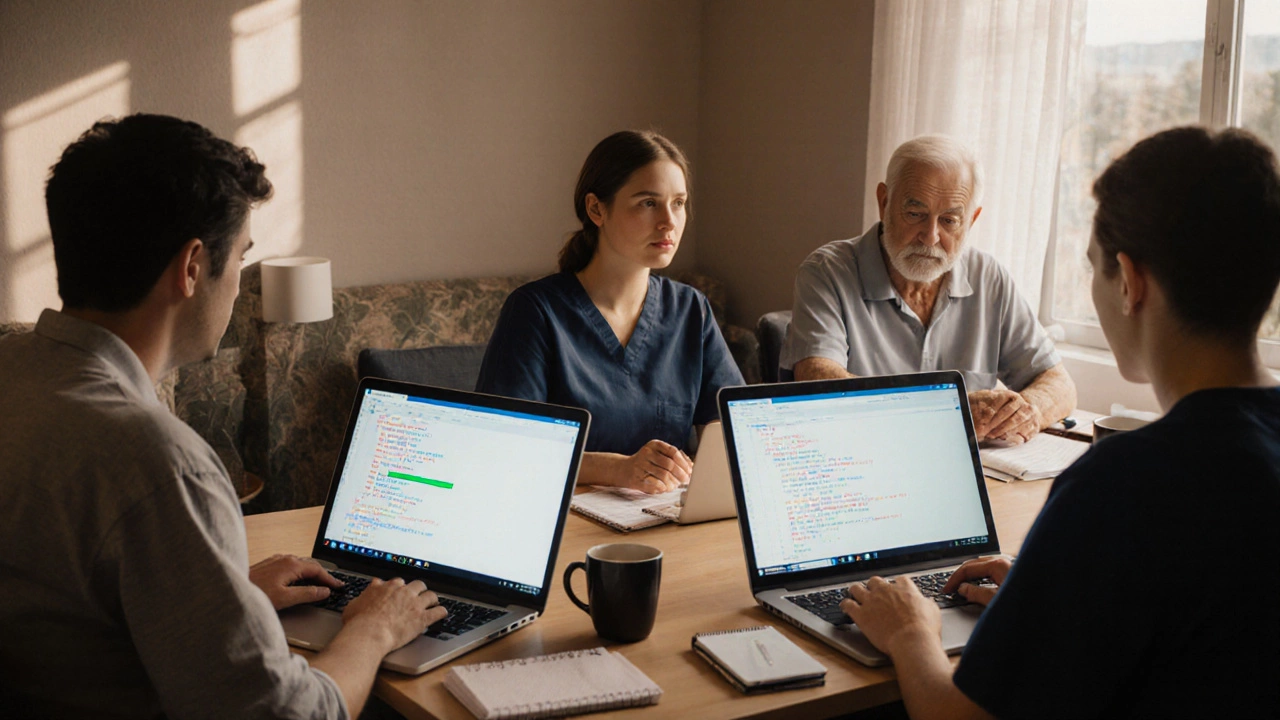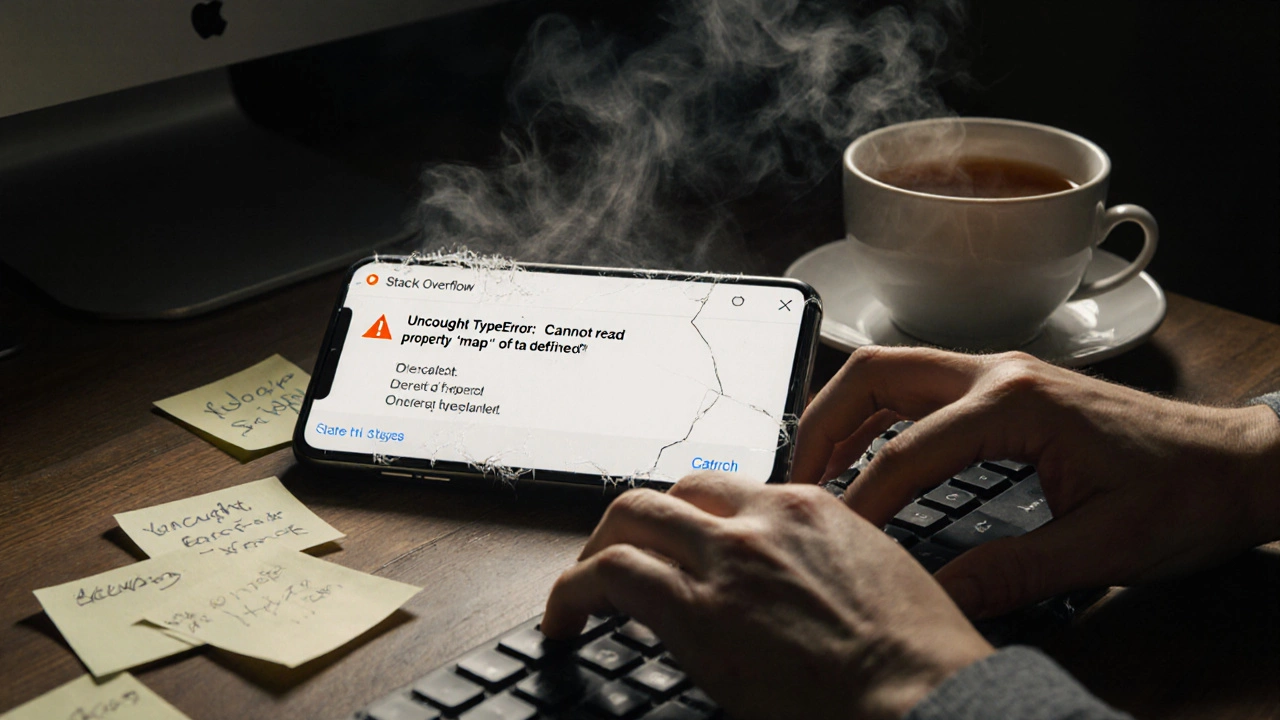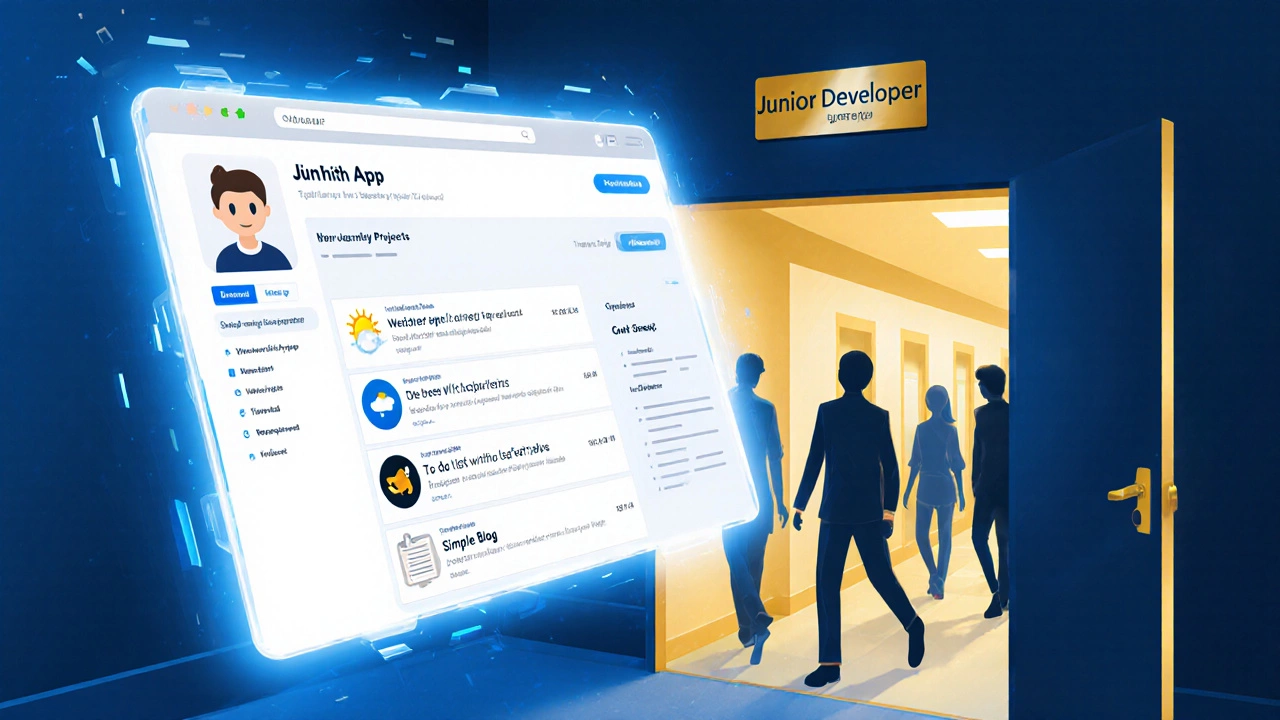
Coding Time Calculator
How long does it take to learn coding? Based on real data from people who got hired without degrees:
Your Estimated Timeline
Note: The article shows that consistency matters more than intensity. One hour a day every day beats 10 hours once a week.
Ever stared at a screen wondering if you can really learn to code without a classroom, a degree, or a mentor? You’re not alone. Thousands of people - parents, nurses, baristas, retirees - are doing it right now. And yes, it’s possible. But it’s not magic. It’s not about being a genius. It’s about showing up, making mistakes, and keeping going.
What Self-Taught Coding Actually Looks Like
Most people imagine self-taught coders as lone geniuses typing furiously in dark rooms. The truth? It’s messy. It’s slow. You’ll spend hours stuck on a single error message. You’ll copy code from Stack Overflow without understanding it. You’ll feel like quitting. Then, one day, you’ll build something that works - and it’ll feel like winning a prize.
Real self-taught coders don’t start with Python or JavaScript because they’re "trending." They start because they have a problem to solve. Maybe they want to automate their spreadsheet. Maybe they want to build a website for their small business. Maybe they just want to understand how apps work. That spark - not the language - is what keeps you going.
Where to Start (No Degree Needed)
You don’t need to pay $10,000 for a bootcamp. You don’t need to enroll in a university. Start with free, structured resources that actually work:
- freeCodeCamp - Complete the Responsive Web Design certification. It takes 300 hours, but you’ll build 5 projects by the end. Real websites. Real code.
- Codecademy’s Free Intro to Python - If you want to automate tasks or analyze data, this is the fastest path. No fluff. Just typing and seeing results.
- The Odin Project - A full-stack curriculum built by developers who got hired without degrees. It’s rigorous, but it’s designed for people who learn by doing.
These aren’t videos you watch. They’re exercises you do. Every lesson ends with a task. If you skip the task, you learn nothing. That’s the rule.
The One Skill That Separates Beginners From Those Who Make It
It’s not memorizing syntax. It’s not knowing the latest framework. It’s learning how to read error messages.
When you see "Uncaught TypeError: Cannot read property 'map' of undefined," most people panic. Self-taught coders learn to break it down:
- What does "undefined" mean? (The variable doesn’t have a value.)
- Where did it come from? (Check the line before.)
- What’s supposed to be there? (An array? A string?)
Google that error. Read the first three results. Try one fix. If it doesn’t work, try another. This process - debugging - is the real job of a programmer. And it’s a skill you build by doing, not by watching.
How Long Does It Really Take?
There’s no magic number. But here’s what people who landed their first dev job actually did:
- 15-20 hours a week for 6 months - that’s 3-4 hours a day, 4 days a week.
- They built 3-5 real projects - not tutorials. Things like a weather app that uses real data, a to-do list that saves to the browser, or a simple blog.
- They shared their code on GitHub. Not because they were proud - because they needed feedback.
Some people get hired in 4 months. Others take 18. It doesn’t matter. What matters is consistency. One hour a day, every day, beats 10 hours once a week.

What You’ll Actually Use in Real Jobs
You don’t need to learn everything. Focus on what’s used right now:
- HTML/CSS/JavaScript - The foundation of every website. If you want to build anything visible on the web, this is non-negotiable.
- Python - Great for automation, data, or backend work. Easy to start with, powerful when you grow.
- Git and GitHub - Not optional. Employers check your GitHub. Learn how to commit, push, and write clear messages.
- Basic command line - You’ll use it to run your code. Learn
cd,ls, andmkdir. That’s it.
Ignore the hype. You don’t need React, Vue, or TensorFlow on day one. Master the basics. Build things. Then expand.
Where to Get Help (Without Spending Money)
You won’t figure everything out alone. Here’s where to ask:
- Stack Overflow - Search first. If you can’t find it, ask clearly. Include your code, the error, and what you tried.
- Reddit: r/learnprogramming - Friendly community. People here have been where you are.
- Discord coding servers - Search for "free code help" on Discord. Many have active channels for beginners.
Never ask: "Why doesn’t this work?" Always ask: "I’m trying to do X. I wrote Y. I got error Z. I tried A and B. What am I missing?" Specific questions get specific answers.
How to Know You’re Ready for a Job
You don’t need a degree. You need proof you can solve problems.
Here’s the checklist:
- You’ve built 3 projects from scratch (not copied from a tutorial).
- Your code is on GitHub with a README explaining what each project does.
- You can explain your code out loud - not just recite it.
- You’ve applied to at least 10 entry-level jobs or internships.
Entry-level roles like "Junior Frontend Developer," "Technical Support Analyst," or "Data Entry with Automation" are your door in. Don’t wait until you feel "ready." Apply when you’ve built something real.

What Most People Get Wrong
They think learning to code is about memorizing. It’s not. It’s about pattern recognition. You’ll see the same structure over and over:
- Get data → Process it → Show it
- Wait for a click → Run a function → Update the screen
Once you see that, you stop memorizing. You start thinking.
Another mistake? Comparing yourself to YouTube stars who build apps in 5 minutes. Those are highlights. You’re seeing the end of a 3-month journey. Your journey is yours. No one else’s.
What Happens After You Learn?
Learning to code isn’t the end. It’s the start of a new way of thinking. You’ll start seeing problems differently. You’ll automate your bills. You’ll fix your phone’s backup script. You’ll build a tool for your kid’s homework tracker.
And then - if you want - you’ll apply for a job. Or start a side business. Or switch careers. The door opens when you’re ready. Not when someone else says you are.
Can I learn to code if I’m not good at math?
Yes. Most coding doesn’t require advanced math. You’ll use basic arithmetic, logic, and percentages. You don’t need calculus to build a website or automate a spreadsheet. The math you do need is taught as you go - in context, not in theory.
Is it too late to start coding at 30, 40, or 50?
No. The average age of someone switching to coding is 34. Many people start after raising kids, after losing a job, or after decades in another field. What matters isn’t your age - it’s your persistence. Companies hire people who solve problems, not people who graduated last year.
Do I need a computer science degree?
No. A 2023 Stack Overflow survey found that 68% of professional developers are self-taught or learned through bootcamps. Employers care more about what you can build than what’s on your diploma. Your GitHub and your projects are your resume.
What if I get stuck for days?
That’s normal. Even senior developers get stuck. The trick isn’t to avoid it - it’s to manage it. Take a walk. Sleep on it. Break the problem into smaller pieces. Ask for help with specific details. Stuck isn’t failure. It’s part of the process.
How do I stay motivated?
Build something that matters to you. A site for your mom’s bakery. A tracker for your fitness goals. A tool to organize your recipes. When your code solves a real problem you care about, motivation follows. Don’t chase trends. Chase your own needs.
Next Steps: What to Do Today
Don’t wait for Monday. Don’t wait until you "have more time." Here’s what to do in the next 24 hours:
- Go to freeCodeCamp.org and start the Responsive Web Design course.
- Write down one thing you want to build - even if it’s small. "A page that shows my favorite books." That’s enough.
- Set a calendar reminder: 30 minutes every day, same time, for the next 30 days.
You don’t need to be perfect. You just need to begin. And you already did - by reading this far.




